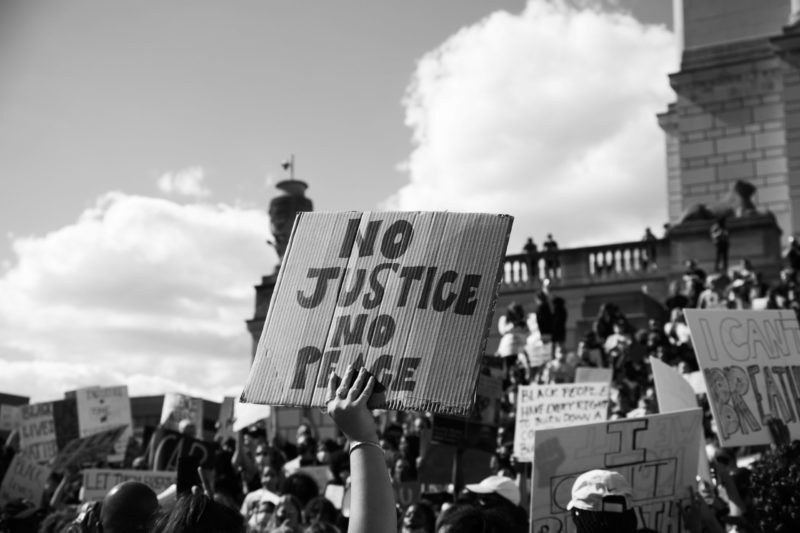I’ve watched events in the United States with heartbreak and horror and know many similar issues need tackling right here at home too.
The sight of a police officer – someone given power over individuals by the state to keep us safe – with his knee on a suffocating man’s throat is distressing beyond words. But this isn’t just two men, it’s a white man in a position of power murdering a black man who isn’t, surrounded by so many others who could have intervened but chose to stand by.
In the same week we saw a white woman in Central Park breaking the law by allowing her dog to roam free despite being in a wildlife-friendly area. When a birdwatcher asked her politely to put her dog on a lead, instead of doing what seems so straightforward and obvious she instead reached for her phone, voice full of fake emotion, and called the police saying ‘I’m being attacked by an African American man and I’m fearful for my life’.
In both cases we wouldn’t have known about this unless they’d been filmed. A New York prosecutor said that had the video not existed it is quite possible a conviction could have been secured on the back of that call.
As someone who is empowered and white I simply cannot know or even imagine what that feels like: to live life knowing that at any moment the might of law enforcement could be turned against me, meaning I could lose everything including my liberty, based on nothing more than the phone call of a passer by.
Someone asked on social media why I hadn’t said more about this in public. The truthful answer is that I just haven’t known what to say that could possibly match the scale of hurt, frustration and vulnerability felt by people of colour.
After all, politicians have been promising change for so long yet the problem persists. I don’t want to be that person who says the words and gives hope but not the deeds that’ll make a difference.
So in recent days I’ve done a lot of reading – consuming news, opinion, and several chunky reports into institutional racism.
I’ve done a lot of listening, like today’s ‘The Daily’ podcast from the New York Times which interviews the mayor of Minneapolis in a calm but very detailed way. I was stunned when he said that he knew there were racists in his police force but he and his three predecessors had failed to reform the police contract in a way that would enable them to be rooted out of service. It was textbook institutional racism, the system closing around those within an organisation at the expense of the community it should serve.
I’ve done a lot of watching too. Most emotional for me was watching again one of the most profoundly moving speeches I’ve come across – Robert Kennedy’s speech in Indianapolis the night Martin Luther King was assassinated. A white man, the epitome of privilege, standing on the back of a truck in what was known in 1968 as a ‘black ghetto’, and telling them about the murder but using the power of oration to channel anger. It was empathetic, informed and thoughtful, all the more remarkable that such an important speech in such a potentially volatile situation was delivered without notes, from the heart. If you’ve not seen it, please watch the speech, it’s only 5 minutes long. It shows every ounce of leadership that Donald Trump lacks and is a stark reminder of why good leadership matters. 100 cities rioted that night 52 years ago, but not Indianapolis. Leadership matters.
Most importantly I’ve been asking myself ‘what can I do’.
On an issue this important, this central to who we aspire to be as a country, slogans and symbolism that isn’t matched with actions would be a terrible legacy for those who’ve lost their lives. So here is my pledge to you:
I’m now in Labour’s Justice Department team. Over the weekend I re-read David Lammy’s review into treatment of BAME people in Britain’s criminal justice system. Even though it was published a couple of years ago, its findings are shocking. Ethnic groups making up 14% of the population make up 25% of prisoners and 20% of youngsters in the youth justice system, a staggering 41% in youth custody.
The reasons go far beyond the police and courts system and extend to the way we distribute support, jobs, and community investment. It covers ethnic representation in senior jobs throughout our public sector but justice system in particular.
The next week is a very busy one for me as I’m seeing legislation through parliament on domestic abuse, the first time I’ve done this before. However, I will also find time to follow up the many aspects of institutional racism that have been highlighted in the criminal justice system and I’ve got a meeting arranged with David Lammy next Friday to discuss the issue and seek his advice and input.
I’m promising to play an active, committed, and persistent role in tackling the ethnic imbalance and institutional racism that exists within our criminal justice system. Because of the job I currently have it’s the best thing I can think that I can personally do that has a hope of making me an ally to the people of colour who so desperately needs allies in this time of desperation but also hope. I want to play my small part in giving that hope justification.
There is more than needs doing than I or any one person can achieve alone. Each of us must figure out that that means for us as individuals. We must each ask ourselves ‘what do I do tomorrow that I wasn’t doing today that will make a difference?’.
If we say we care today but don’t do something different tomorrow then nothing will change.

